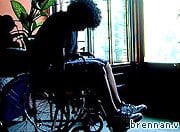A severely disabled woman has urged other disabled people who may feel like ending their lives not to abandon hope for the future.
Marini McNeilly, who suffers from a condition known as ‘locked-in syndrome’, is paralysed and can only move her face, head and, very slightly, her fingers.
In an interview with The Times newspaper she calls for other sufferers not to give up hope, saying: “Hope is the last thing you should lose.”
Kill
Mrs McNeilly’s comments come in the wake of a legal challenge by Tony Nicklinson, who also suffers from ‘locked-in syndrome’, to force the Director of Public Prosecutions to issue guidance clarifying whether his wife would be prosecuted for murder if she kills him.
Mrs McNeilly, who taught English and Spanish, was left paralysed by a series of strokes two years ago, and was only able to move her eyes and her head slightly.
There were times in the first few months when Mrs McNeilly had little hope for the future and feared that she may never be able to communicate with people again.
Optimism
But now, communicating her thoughts by looking at letters and words on a Perspex board, Mrs McNeilly describes herself as “full of optimism”.
And she described the source of her optimism, saying: “I feel I owe it to the people who cared”.
Speaking about the case of Mr Nicklinson she said: “It’s a very personal thing.”
She added: “Where there is a challenge there is hope to meet it.”
Signalled
Earlier this month it was revealed that a paralysed father-of-two was about to have his life support machine turned off when he signalled to doctors that he wanted to live by using eye movements.
The family of motorcycle enthusiast, Richard Rudd, had decided to switch off the machine based on comments he had made in the past.
Speculating on what he would do if he were ever paralysed by a motorcycling accident, Mr Rudd had previously said he wouldn’t want to live.
Hope
But doctors realised Mr Rudd had changed his mind when they discovered he was able to move his eyes in response to questions.
Mr Rudd’s will to live has given his girlfriend hope for the future.
Kate Wilson said: “If this is how far he’s come in eight months, I just want to see what the next eight months bring”.
“He’s a fighter and he wants to live, so I am praying for a miracle. I just want my boyfriend back and I still can’t believe how close I came to losing him.”
I’m grateful I wasn’t allowed to end it all!
Alison Davis is National Co-ordinator of No Less Human. She was born with severe spina bifida, and is dependent on a wheelchair. She is often in extreme pain for hours at a time. She says that for many years she wanted to “end it all”.
“If euthanasia had been legal, I would certainly have requested it and I wouldn’t be here now,” she says.
But after several serious suicide attempts, blocked by the intervention of Alison’s friends, she began to change her mind.
Alison met the disabled children she had been sponsoring through a charity. The experience led her to think, for the first time in over ten years, “I think I want to live”.
She says: “I’ll always be grateful to the friends who saved my life (though I wasn’t at the time). And I’m especially thankful there was no possibility of persuading my doctors to legally help me die.”
She believes that disabled people “deserve the same kind of help routinely given to those who do not have a physical condition but who feel suicidal”.


